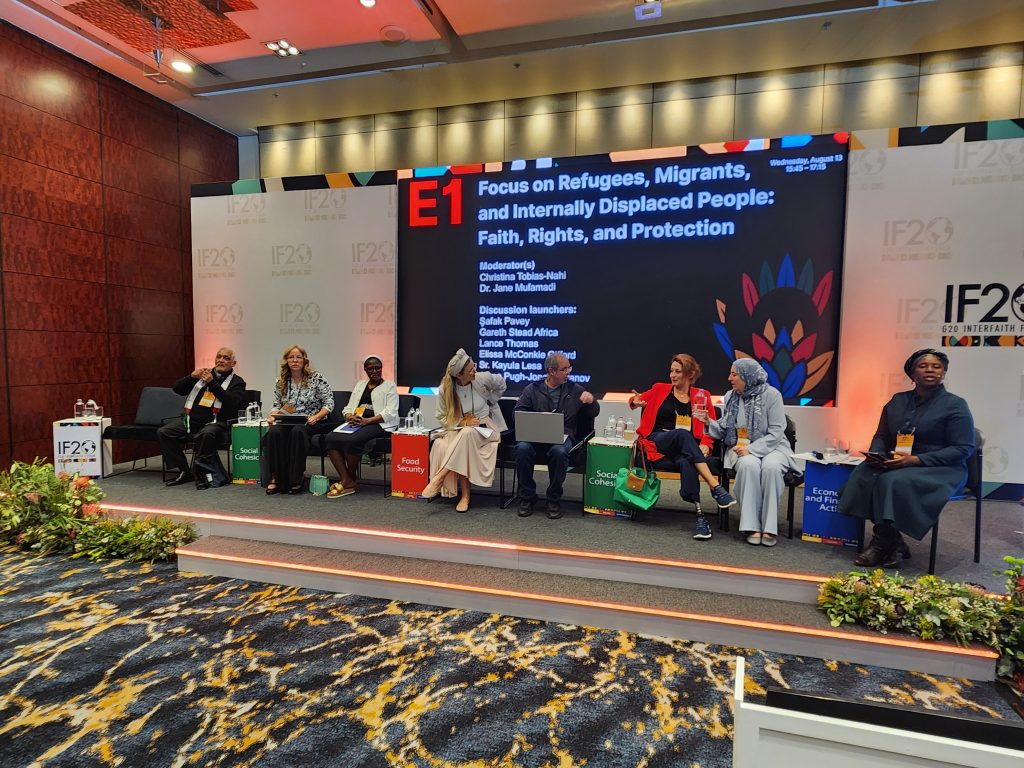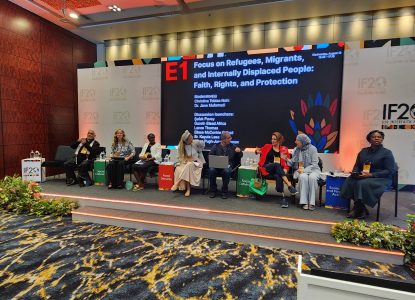By Luisa Banchoff
– – –
Throughout this year’s G20 Interfaith Forum, participants have attended plenary sessions focused on priority areas for the G20, including hunger and poverty, economic and financial action, education, sustainability, and care for the most vulnerable. Complementing these plenaries are over 30 breakout sessions. These have been spaces for more intimate, focused conversations; some have delved deeper into topics from the plenaries, while others have focused on others issues where faith communities have a prophetic voice to play: peacebuilding, health, refugees and migrants, women, children and youth, human trafficking, corruption, inequality, racism and discrimination, religious literacy, mental health, religious freedom, traditional communities, and media and AI ethics.

One of the sessions looked at the role of women in peacebuilding. Participants explored the question of why women are often excluded from formal peace negotiations and led to a deeper discussion of women’s systematic exclusion from leadership in both secular and religious spaces. The importance of expanding and nuancing language was a common theme. Prof. Nayla Tabbara, President of the Adyan Foundation, shared how she and her colleagues had to invent a new word for a female religious leader, as the Arabic term equates to “religious man.” The group reflected on how prevailing understandings of authority are heavily gendered, and that men can be dismissive or uninterested in women’s inclusion. Indeed, while the session was well-attended, participants lamented the relative lack of men in the room, and several made the case that it should be a plenary.
Later in the day, participants gathered for a breakout session focused on refugees, migrants, and internally displaced people. Drawing on the plenary theme of protecting the most vulnerable, participants shared concrete examples of how religious communities provide care to migrants and refugees when governments turn their backs. Sr. Kayula Lesa, Director of Talitha Kum Zambia, shared her experience accompanying Ethiopian migrants stranded in Zambian correctional facilities, and the challenge of helping them return to their homelands. Gareth Stead, Head of Nation Building for Every Nation Churches, spoke of how churches and mosques in Cape Town provided shelter for people fleeing xenophobic violence in May 2008, all while “government leaders were asleep.” Elissa McConkie Gifford, Director of Global Field Operations for The Church of Jesus Christ of Latter-Day Saints called on faith communities to facilitate friendship between migrants and local people in order to build more open-hearted, welcoming societies.
In delving deeper into these and other topics, the breakout sessions provided a space for participants to grapple with difficult questions, reflect on their own experiences, and share concrete examples of positive change. As the G20 Interfaith Forum draws to a close, the question remains as to how participants will apply the lessons learned and topics debated in their own work.
Featured Quotes from Day Three
On cultivating a spirituality of resistance:
“We need a spirituality that emboldens us to resist and challenge economic, social and ecological injustices. We need a spirituality of metanoia: a transformative spirituality that inspires us to do things differently and develop alternatives. We have a critical task as communities of faith to generate, propagate, and nurture such spirituality.” – Rev. Prof. Dr. Jerry Pillay
On humanizing the development sector:
“If you want to address the plight of the most vulnerable, we need to deeply humanize multilateralism. We need multilateralism to be driven by human voices – the voices of religious leaders and faith organizations.” – Adama Dieng
On defending human dignity:
“It is a spiritual imperative of every believer to challenge the powers that be and the hardwired systems that undermine the dignity of human beings. As long as we don’t do that, we are failing our brothers and sisters and our relationship with God.” – Amanda Khozi Mukwashi
– – –
Luisa Banchoff served as a research and report writer for the World Faiths Development Dialogue. She graduated summa cum laude from Princeton University with a B.A. in religion and earned a master’s degree in social anthropology from the London School of Economics.


